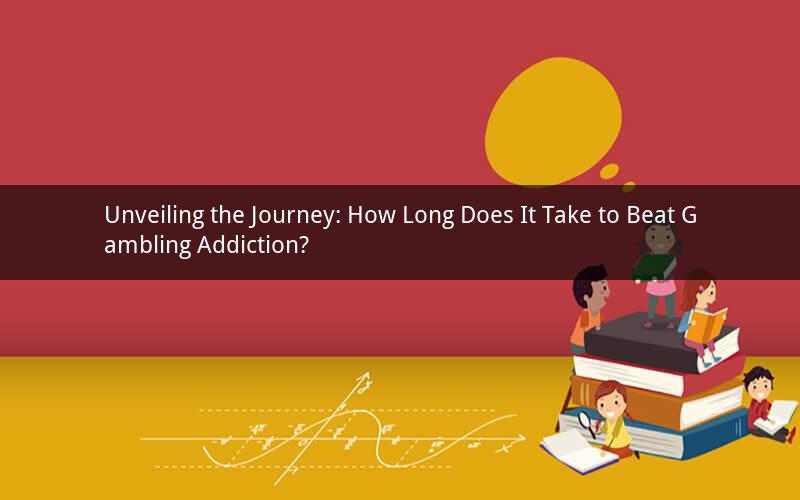
Introduction:
Gambling addiction is a complex issue that affects millions of individuals worldwide. Understanding the duration it takes to overcome this addiction is crucial for those seeking recovery. This article delves into the factors influencing the recovery process and provides insights into the time it may take to beat gambling addiction.
1. Understanding Gambling Addiction:
Gambling addiction, also known as problem gambling or compulsive gambling, is characterized by an uncontrollable urge to gamble, despite negative consequences. It is a behavioral addiction that can lead to financial, emotional, and social problems. To beat gambling addiction, it is essential to comprehend its nature and the challenges it presents.
2. Factors Influencing Recovery Time:
The duration it takes to beat gambling addiction varies for each individual. Several factors contribute to the recovery process, including:
a. Severity of the addiction: The severity of gambling addiction plays a significant role in determining the recovery time. Those with a mild addiction may experience quicker recovery, while severe cases may require a longer period.
b. Support system: Having a strong support system, including family, friends, and professionals, can greatly impact the recovery process. A supportive network can provide emotional support, encouragement, and practical assistance throughout the journey.
c. Treatment and therapy: Seeking professional help, such as therapy or counseling, can significantly speed up the recovery process. Therapies like cognitive-behavioral therapy (CBT) and motivational interviewing have proven effective in treating gambling addiction.
d. Personal motivation: The individual's willingness to change and commit to recovery is crucial. A strong motivation to overcome addiction can lead to a quicker and more successful recovery.
3. The Recovery Process:
The recovery process from gambling addiction is a gradual and ongoing journey. It typically involves several stages:
a. Acknowledgment: The first step is acknowledging the problem and accepting that gambling addiction is a real issue. This recognition is essential for seeking help and initiating the recovery process.
b. Seeking help: Once the addiction is acknowledged, seeking professional help becomes crucial. This may involve consulting therapists, joining support groups, or attending rehabilitation programs.
c. Treatment and therapy: Professional treatment and therapy are vital in addressing the underlying causes and triggers of gambling addiction. Various therapeutic approaches, such as CBT, can help individuals develop healthier coping mechanisms and reduce the urge to gamble.
d. Relapse prevention: Relapse is a common challenge in the recovery process. Learning strategies to prevent relapse, such as identifying triggers and developing a relapse prevention plan, is crucial for long-term recovery.
e. Ongoing support: Maintaining a strong support system and attending support groups can provide ongoing support and encouragement throughout the recovery journey.
4. The Duration of Recovery:
The duration it takes to beat gambling addiction varies for each individual. Some may experience recovery within a few months, while others may require several years. On average, it may take anywhere from 6 months to 5 years to overcome gambling addiction. However, it is important to note that recovery is a lifelong process, and relapse is possible.
5. Frequently Asked Questions:
Q1: Can gambling addiction be cured completely?
A1: While gambling addiction cannot be completely cured, it can be effectively managed and controlled through proper treatment and ongoing support.
Q2: How can I tell if I have a gambling addiction?
A2: Signs of gambling addiction include an uncontrollable urge to gamble, neglecting responsibilities, experiencing financial difficulties, and feeling remorse or guilt after gambling.
Q3: Can therapy alone help overcome gambling addiction?
A3: Therapy alone can be effective in treating gambling addiction, but it is often recommended to combine therapy with other support mechanisms, such as support groups or rehabilitation programs.
Q4: Is it possible to recover from gambling addiction without professional help?
A4: While it is possible to overcome gambling addiction without professional help, seeking support from therapists, counselors, or support groups can significantly enhance the recovery process.
Q5: Can medication help in treating gambling addiction?
A5: Medication is not commonly used to treat gambling addiction. However, certain medications may be prescribed to address underlying mental health issues that contribute to gambling addiction.
Conclusion:
Overcoming gambling addiction is a challenging but achievable goal. Understanding the factors influencing recovery time and the stages involved can help individuals navigate the journey towards recovery. With the right support, treatment, and personal commitment, it is possible to beat gambling addiction and lead a healthier, more fulfilling life.